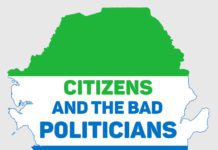
Sierra Leone which direction? A lack of clarity means a lack of leadership.
By Mahmud Tim Kargbo.
“Grasp the thing; the words will follow.” Cato’s pithy advice has little traction in modern Sierra Leone, where politicians routinely deploy word screens to conceal either the bankruptcy of their understanding of the issues facing their people or their cynical manipulation of the truth. Speaking for hours without saying anything substantial has become an essential qualification for advancement in Sierra Leone politics, yet it is a shameless parody of the quality without which leadership is impossible: clarity.
Great minds from Plato to Solzhenitsyn have warned of the dire threat posed to civilisation by the corruption of language, but George Orwell charted the dangers for a wider audience in his classic essay, Politics and the English Language, published in 1946. “The great enemy of clear language is insincerity. When there is a gap between one’s real and one’s declared aims, one turns, as it were, instinctively to long words and exhausted idioms, like a cuttlefish spurting out ink. In our age in Sierra Leone, there is no such thing as ‘keeping out of politics’. All issues are political issues, and politics itself is a mass of lies, evasions, folly, hatred, and schizophrenia.”
Clarity-in-the-cloud-small would be that those words would reverberate in our chambers of political debate and our deeply dysfunctional workplaces. And as Orwell further pointed out, “But if thought corrupts language, language can also corrupt thought.” This, of course, has become an epidemic in Sierra Leone since independence.
Clarity is the sine qua non of leadership; doubt and uncertainty are the tools of misleaders. However, in the 1980s and ‘millennium, another dog-eat-dog, win-at-all-costs mood swept the politics of Sierra Leone and business, with a new vocabulary to justify opportunistic policies that hurt both corporations and people. Words like “New All People’s Congress”, “Agenda for Attitudinal and Behavioural Change”, “Agenda for Prosperity”, “New Direction”, “re-engineering”, “progressive alliance,” and “restructuring” tried to hide the fact that many charlatans were simply trying to make a fast buck.
That’s when some politicians, business gurus, and pop psychologists decided to resurrect the old modernist literary device of “ambiguity”. We were told that “ambiguity tolerance” was good and “ambiguity intolerance” was bad, and that leaders who could live with ambiguity were more creative and resilient. Of course, what they really meant was that it was okay to do whatever works for you at any given time. So, vision and strategy went out the window, and the cynical and deceptive rule of short-termism was upon us. Misleaders in Sierra Leone reveled in this new age of license while their ordinary people, their employees, confused and insecure, suffered terribly and still suffer.
This was only one element among many in creating the brave new culture of deceit in Sierra Leone. Developments like the renewed attack on objective truth by people claiming their own arguments to be absolutely beyond question and the burgeoning tsunami of tribalism and regionalism, in which the majority in social positions of trust see others merely as means to their own selfish ends, all tend to promote a milieu of uncertainty, disillusionment, and cynicism.
Consider just some of the evidence of the ongoing catastrophe of this age of uncertainty in Sierra Leone: More data and more communication channels than ever have left the general public utterly confused about pivotal issues like education, the essentials of life, globalisation, and national political tensions; the current Sierra Leone economic malaise is not a systemic but a moral failure with guilty parties on all sides and debt rising to inconceivable levels; the decline of Sierra Leone proceeds apace with massive corruption by both the ruling regime and the opposition as the tip of a monster iceberg, while ordinary folks have no idea of what is actually going on. Of course, the malaise is reflected in popular entertainment by a sense of humour that is at once detached and deeply ironic.
A manager of a now-closed large multinational mining company complained to me about his inability to read his CEO’s inconsistent directions, and he ruefully acknowledged that the impact on his extensive team of direct reports was sabotaging their performance. When I suggested that his boss’s unpredictable behaviour was probably the result of similarly random instructions from his superiors overseas and the Sierra Leone government, he nodded helplessly and confided that he was deeply concerned about the CEO’s state of mind. How do you address a lack of understanding and, therefore, commitment that is eroding the unity of the company at every level?
The loss of clarity has delivered a debilitating loss of trust, and that has undermined the entire social fabric of Sierra Leone. No wonder dysfunctional relationships of all types characterise our society today.
People today, more than ever, want answers, and wanting answers means wanting clarity, which is just another way of saying that they want the truth. To pretend that our limited and fallible human reason puts truth beyond reach and that each individual has the right to make their own truth is simply duplicitous. And it plays right into the hands of the manipulators.
Most of the people I speak to in the workforce, who represent a substantial and diverse cross-section, are uncertain, uninspired, and motivated only by an ever-hardening survival instinct. No wonder money has soared in the rankings of happiness factors in the workplace over the past few years. Just like in the past, people no longer have leaders in either their workplace or the nation who hold up a vision of a better future built on virtue and a clear pathway to get there. They know only misleaders and non-leaders who have abdicated their responsibilities to focus on their own self-aggrandisement.
If this sounds depressing and defeatist, think again, because there has never been a greater opportunity for leaders to stand up and be counted. Of course, counting also demands clarity, but there are definite signs of a silent shift being driven in unexpected quarters. The number of bright and well-qualified young people now choosing to dedicate their lives to helping the less fortunate or to start their own enterprises rather than getting trapped, like so many of their friends, in the petty frustrations of the corporate companies in Sierra Leone is an expression of the desire for clarity.
Likewise, the growing disillusionment with sham democratic politics is becoming a real threat, on many fronts, to the social cohesion we have taken for granted for so long. Tragically, state schooling has ensured that the discontent is severely uninformed and therefore more malleable and dangerous, but it is still a timely warning that more of the same will no longer do.
Human beings are rational animals; clarity is essential for their well-being. That is why, in this age of misleadership in Sierra Leone, the opportunity for leaders has never been greater or more urgently crying out to be addressed.




